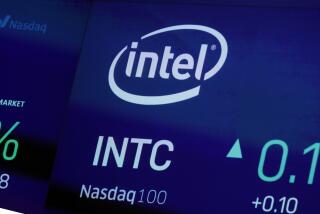Struggling Maker of Chips Cuts Jobs
- Share via
Chip maker Transmeta Corp. on Thursday announced a major corporate restructuring, a 24% reduction in its workforce and the hiring of a new chief executive as it tries to survive amid much larger rivals.
Five years after its splashy public debut at the sunset of the tech boom, the unprofitable maker of low-power microprocessors for notebooks and other computers said it would focus on licensing its technology and intellectual property to other companies.
It will continue to sell some chips but has changed the terms and conditions of its agreements with computer makers. As a result, some have canceled their deals with the Santa Clara, Calif.-based company.
Transmeta also cut 67 employees, leaving it with 208 worldwide.
In addition, it announced the departure of Chief Executive Matthew Perry. Arthur L. Swift was named as his replacement. Swift previously was the company’s senior vice president of marketing.
Transmeta also said it had reached a multiyear agreement with Sony Corp. and Sony Computer Entertainment Inc. to “accelerate and expand” the adoption of the chip maker’s power management technology into Sony products.
That includes derivatives of the Cell microprocessor, which Sony has developed along with International Business Machines Corp. and Toshiba Corp. These will be used in Sony’s next-generation PlayStation video game console, among other devices.
“The combination of our operating expense reduction plus the new business prospects that we’ve won will result in a much more financially sound company than we previously had,” Swift said.
Shares rose 8 cents to 93 cents on Nasdaq. They climbed another 22 cents, to $1.15, in after-hours trading following the announcements.
Under the Sony agreement, Transmeta will be paid for the services of more than 100 of its engineers.
It was not immediately clear whether the deal to license the power management technology was the result of issues with the hotly anticipated Cell processor.
All semiconductor companies have been facing challenges with managing power and heat as processors become more complex.
In fact, Transmeta’s goal was to produce a processor that was both energy-efficient and powerful for use in laptops but remained compatible with standard PC chips. Other companies, including much larger Intel Corp. and Advanced Micro Devices Inc., had similar plans.
In 2003, Intel launched Centrino Mobile Technology, which included an energy-efficient microprocessor for notebooks as well as wireless capabilities. The company also could afford to spend hundreds of millions of dollars to market the brand.
Transmeta’s Crusoe and, later, Efficeon chips never saw broad adoption in the United States. The company also suffered from production problems.






